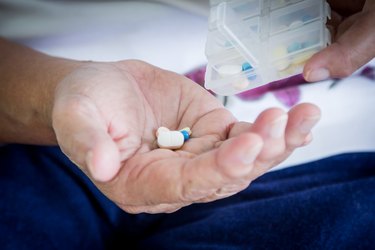
A thyroidectomy could be a partial or total removal of your thyroid gland. Your thyroid is part of your endocrine system and regulates metabolism. After having your thyroid removed, you will need to take replacement thyroid hormones to boost your metabolism and keep other systems functioning. Although iodine is needed for your thyroid to manufacture hormones, once your thyroid is removed, you shouldn't need iodine supplementation.
Thyroidectomy
Video of the Day
Your thyroid is part of your endocrine system and produces the hormones that regulate the rate your body burns both calories and oxygen -- your metabolism. A "subtotal" or partial thyroidectomy removes part of the gland; which is located in front of your vocal cords at the base of your throat. If the entire gland is removed, it's known as a complete or total thyroidectomy. A thyroidectomy may be needed if you have thyroid cancer, tumors, nodules, an extremely overactive thyroid or a goiter so enlarged that it interferes with your breathing or swallowing.
Video of the Day
Hypothyroidism
Once your thyroid is removed, you will be hypothyroid -- if you had a subtotal thyroidectomy, you may produce some hormones naturally but rarely the amount your body needs; a total removal of your thyroid gland means that you'll have no natural thyroid function. In either case you'll probably have to take a daily synthetic thyroid replacement for the rest of your life. Levothyroxine is the most common thyroid hormone replacement; it's sold under several different brand names, including Levoxyl, Synthroid, Unithroid and Tirosint. Follow your doctor's directions for taking levothyroxine, as other supplements and some foods can interfere with your body's ability to absorb this medication.
Iodine and Thyroid Hormones
Iodine deficiency can cause hypothyroidism, but it's very rare in the United States. Iodine supplementation can only help hypothyroidism if an iodine deficiency is the cause of your sluggish thyroid. Under normal circumstances, up to 80 percent of your iodine intake is used by your thyroid to produce hormones. But once your thyroid is removed, you're no longer producing hormones -- instead you are taking synthetic hormones. After a complete thyroidectomy, you should not need iodine supplementation, because your body is not making its own hormones.
Iodine Consumption
For normal thyroid function, the American Thyroid Association recommends between 150 and 299 micrograms of iodine -- the vast majority of this iodine was used by your thyroid, although an iodine deficiency can stop ovulation, leading to infertility. During pregnancy, women need additional iodine to prevent mental retardation; it's critical for fetal nervous system development. In the 1920s, salt was iodized to ensure adequate intake. One tsp. of iodized table salt has 400 micrograms of iodine. Dairy, eggs, soy milk, shellfish and seafood are also good sources of iodine.
- American Thyroid Association: Iodine Deficiency
- Women to Women; Iodine and the Thyroid -- Worth a Second Glance; Marcelle Pick, OB/GYN NP; May 2011
- Medline Plus; Thyroid Gland Removal; Shabir Bhimji, MD, PhD; May 2011
- Mayo Clinic; Hypothyroidism -- Should I Take iodine Supplements?; Todd B. Nippoldt, M.D.; April 2010
- Medline Plus: Iodine; April 2011